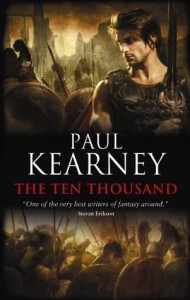 Paul Kearney’s The Ten Thousand was actually the first of his work that caught my eye. It’s a modern retelling of the Anabasis, Athenian historian and soldier Xenophon’s first-hand account of the heroism of Greeks in an expedition to help Cyrus the Younger usurp the Persian throne from his brother, Artaxerxes II.
Paul Kearney’s The Ten Thousand was actually the first of his work that caught my eye. It’s a modern retelling of the Anabasis, Athenian historian and soldier Xenophon’s first-hand account of the heroism of Greeks in an expedition to help Cyrus the Younger usurp the Persian throne from his brother, Artaxerxes II.
I thoroughly enjoyed Kearney’s writing in his Monarchies of God series, so I expected similar writing going into The Ten Thousand. Much to my surprise, the prose is completely different. In the opening pages, it’s quite clear that, although the book is marketed and has some fantastical elements, Kearney wanted to write in a Classical sense, in a way that seemed as if to emulate the way Xenophon himself wrote the tale. It’s strange to get into. Some find historical texts very bland, especially those that were written more than two thousand years ago. Kearney’s felt like that – very Classical, but with the spark that Kearney infuses so well into his stories.
The Ten Thousand‘s tale is of a young man named Rictus, who shortly after the opening scene finds himself in the grand mercenary army of the Macht, who are forming up for an as-yet undisclosed (to the mercenaries) mission. The Macht are the Greeks – great warriors clad in bronze who excel in phalanx combat. The Asurian Empire, or Persia, is filled with peoples of different races. Not just people of different culture or skin color, but people who tower several feet over average humans, others with distinct facial features, and so on. Outside of the different races, there is little to no fantasy in the story. Some Macht warriors carry, instead of bronze breastplates they carry the Curse of God. The Curse of God is a piece of armor that is entirely black and is not affected by age or wear. Owners of the Curse of God are known as Cursebearers. Said armor is really as far as the magical or fantastical element reaches, and that is not a bad thing.
What I was really looking for going into The Ten Thousand was historical accuracy. I’m being a huge hypocrite in this case, because normally I am the one telling people that historical accuracy should not matter in most cases of fiction. I wanted to see how well Kearney could write hoplite and phalanx warfare. I really wanted to see the Greek names of equipment. Turns out that he writes some of the best phalanx warfare scenes I have ever read, right up there with Christian Cameron. Down to the different file ranks inside the phalanx itself, he nailed it. He also included, much to my historian’s delight, a case of escheloned/staggered advance, where one side of the battle-line advanced more than the other, allowing said side to wreak havoc and circle around. (For a historical example, see: Battle of Leuctra). Kearney, while utilizing the names of some of the hoplite equipment, such as the aichme and sauroter – the two ends of the spear, also created words in the Macht language that felt just as Greek as the actual names.
Although the plot is known from the start (unless you don’t know anything about the Anabasis), Kearney still managed to keep the story suspenseful. The Ten Thousand is a story of brotherhood and friendship, love and loss with a good cast of characters – akin to the Chain of Dogs in Malazan’s Deadhouse Gates (do not look that term up if you have not read the second Malazan book). It’s truly amazing how many heroic moments there were in Classical and Hellenistic Greek history – the Gates of Fire, the Ten Thousand, Marathon – there are too many to count. Writers like Kearney and Cameron are masterful at bringing them to life. (Note: you will almost definitely not enjoy this if you don’t like military SFF)
Grab The Ten Thousand on:
Amazon (US)

I know what you mean about the prose. How do I put this…some of the descriptions of the battle scenes almost feel…technical? It’s almost like parts of this could be a handbook for classical warfare. I liked this one, but still not as much as the next book which I recall ended up being a lot more emotional, which incidentally is why I couldn’t continue right away with the third book!
The history-nerd in me loved the technicality, but Kearney may have been showing off a bit in this supposedly fantasy story. Really looking forward to the sequel now!
I love the Anabasis, to a fault, and wonder if that would enhance or detract from the experience of reading this?
I don’t really think it would detract from it. Kearney’s got a knack for writing with a little zing and it’s almost like reading the Anabasis, just from a different perspective.